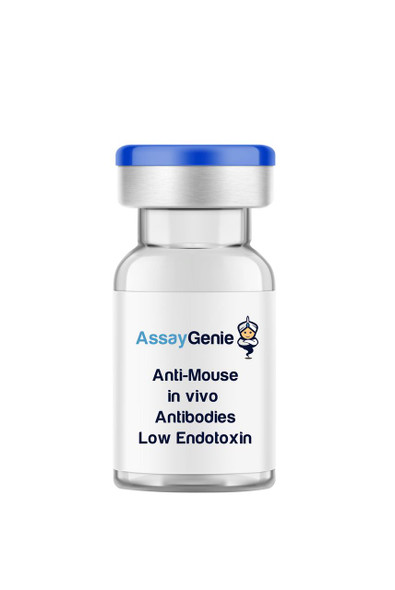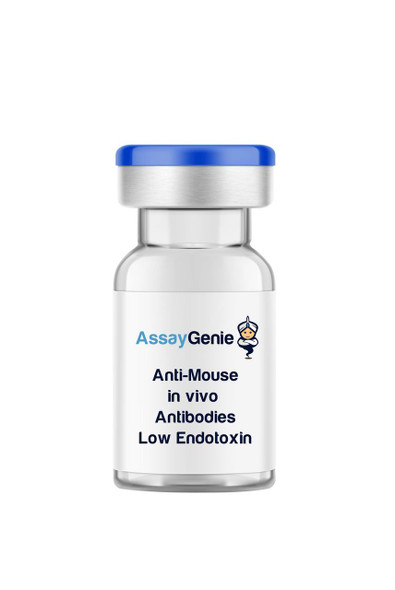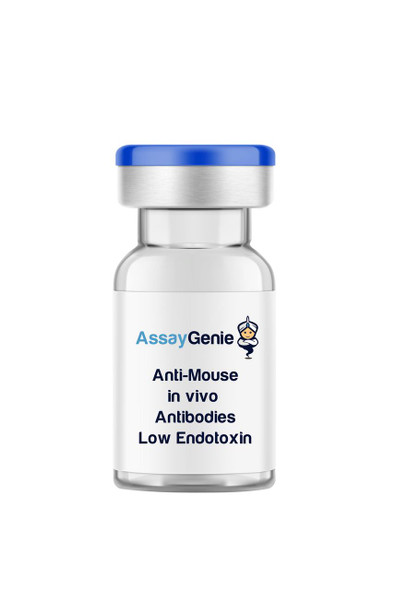Anti-Mouse CD86 In Vivo Antibody - Low Endotoxin (IVMB0156)
- SKU:
- IVMB0156
- Antibody Type:
- Functional-Grade In Vivo Antibody
- Applications:
- In Vivo
- Disease Area:
- Cancer
- Clone:
- GL1
- Protein:
- B7-2
- Isotype:
- Rat IgG2a kappa
- Reactivity:
- Mouse
- Synonyms:
- B7-2
- B70
- Ly-58
- CD-86
- Research Area:
- Immune Checkpoint & Cancer Biology
- Endotoxin Level:
- Low Endotoxin
- Host Species:
- Rat
- Blocking
- WB
Description
Anti-Mouse CD86 In Vivo Antibody - Low Endotoxin
Introducing the Anti-Mouse CD86 In Vivo Antibody - Low Endotoxin from Assay Genie, a highly specific monoclonal antibody meticulously designed for in vivo applications. This antibody targets the CD86 protein, essential in immune costimulatory signals, making it indispensable for research in immunology and related disciplines. Featuring a Rat IgG2a kappa isotype, it ensures exceptional purity and consistently low endotoxin levels (<1.0 EU/mg), making it ideal for ELISA, flow cytometry, immunohistochemistry, and other sophisticated assays. Available in different sizes, it is formulated in phosphate-buffered saline to guarantee stability and efficacy, enhancing your experimental outcomes.
CD86, also known as B7-2, is expressed on antigen-presenting cells such as dendritic cells, macrophages, and B cells. It plays a pivotal role in the immune system by providing necessary costimulatory signals for T-cell activation and survival, particularly through interaction with CD28 and CTLA-4 on T cells. Leverage the reliability and versatility of this antibody to advance your research in studies of immune responses and related phenomena.
| Product Name: | Anti-Mouse CD86 In Vivo Antibody - Low Endotoxin |
| Product Code: | IVMB0156 |
| Size: | 1mg, 5mg, 25mg, 50mg, 100mg |
| Clone: | GL1 |
| Protein: | B7-2 |
| Product Type: | Monoclonal Antibody |
| Synonyms: | B7-2, B70, Ly-58, CD-86 |
| Isotype: | Rat IgG2a κ |
| Reactivity: | Mouse |
| Immunogen: | LPS-activated CBA/Ca mouse splenic B cells |
| Applications: | B, WB |
| Formulation: | This monoclonal antibody is aseptically packaged and formulated in 0.01 M phosphate buffered saline (150 mM NaCl) PBS pH 7.2 - 7.4 with no carrier protein, potassium, calcium or preservatives added. |
| Endotoxin Level: | < 1.0 EU/mg as determined by the LAL method |
| Purity: | ≥95% monomer by analytical SEC >95% by SDS Page |
| Preparation: | Functional grade preclinical antibodies are manufactured in an animal free facility using only In vitro protein free cell culture techniques and are purified by a multi-step process including the use of protein A or G to assure extremely low levels of endotoxins, leachable protein A or aggregates. |
| Storage and Handling: | Functional grade preclinical antibodies may be stored sterile as received at 2-8°C for up to one month. For longer term storage, aseptically aliquot in working volumes without diluting and store at -80°C. Avoid Repeated Freeze Thaw Cycles. |
| Applications: | B, WB |
| Reactivity: | Mouse |
| Host Species: | Rat |
| Specificity: | Clone GL-1 recognizes an epitope on mouse CD86. |
| Antigen Distribution: | CD86 is expressed on activated B and T cells, macrophages, dendritic cells, and astrocytes. |
| Immunogen: | LPS-activated CBA/Ca mouse splenic B cells |
| Concentration: | ≥ 5.0 mg/ml |
| Endotoxin Level: | < 1.0 EU/mg as determined by the LAL method |
| Purity: | ≥95% monomer by analytical SEC >95% by SDS Page |
| Formulation: | This monoclonal antibody is aseptically packaged and formulated in 0.01 M phosphate buffered saline (150 mM NaCl) PBS pH 7.2 - 7.4 with no carrier protein, potassium, calcium or preservatives added. |
| Preparation: | Functional grade preclinical antibodies are manufactured in an animal free facility using only In vitro protein free cell culture techniques and are purified by a multi-step process including the use of protein A or G to assure extremely low levels of endotoxins, leachable protein A or aggregates. |
| Storage and Handling: | Functional grade preclinical antibodies may be stored sterile as received at 2-8°C for up to one month. For longer term storage, aseptically aliquot in working volumes without diluting and store at -80°C. Avoid Repeated Freeze Thaw Cycles. |
CD86 is an 80kD Ig superfamily member that is involved in immunoglobulin class-switching and activation of NK cell-mediated cytotoxicity. CD80 is closely related to, and works in tandem with CD86 to prime T- cells. CD86 is expressed earlier in the immune response than CD80. The ligation of CD28 on T cells with CD80 and CD86 on APCs co-stimulates T cells resulting in enhanced cell activation, proliferation, and cytokine production. CD86 can also bind to CTLA-4 to deliver an inhibitory signal to T cells.
| Technical Datasheet: | View |
| Protein: | B7-2 |
| Function: | T cell costimulation, Ig class-switching, NK cell cytotoxicity |
| Ligand/Receptor: | CD28, CD152 (CTLA-4) |
| Research Area: | Cell Biology, Costimulatory Molecules, Immunology, Neuroscience, Neuroscience Cell Markers |
Meet the team!
Shane Costigan
Territory Manager & Team Lead
Abdul Khadim
Sales Executive







